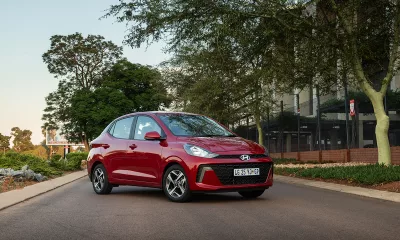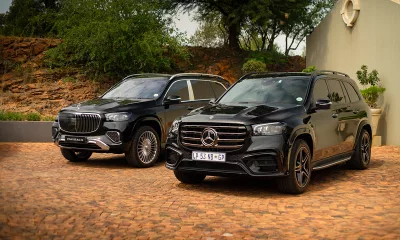It looks pretty much like any other long-wheelbase E67 BMW 7 Series as its Black Sapphire metallic paintwork glistens in the sun. But open the door and you soon realise this is not your everyday stretched Beemer. The door feels like it weighs a tonne and the glass is, well, clearly not your average toughened and tinted pane – it is no less than 57 mm thick. The reason? This 760Li is a Security Edition and was former president Nelson Mandela’s official transport during his HIV/Aids campaign undertaken between 2004 and 2009. Carrying such features as a high-strength floorpan, an emergency exit through the windscreen and an onboard fire-extinguishing system, the car’s overall appearance lacks any form of flash, which is perhaps indicative of Madiba’s personality.
Bullet-proofing the car has naturally made it very heavy – around three tonnes is the guess – but the standard 6,0-litre V12 engine has enough power (327 kW) and torque (600 N.m) to still provide rapid, unstressed performance, vital if ever a threatening situation arose. At the wheel, its mass is only mildly apparent, but with all the power-assisted driver aids, it in no way feels unwieldy. In fact, the weight seems to cosset the damper-controlled ride probably even more than the standard car’s – certainly none of the road irregularities over which I drove were felt in the cabin. In deference to the car’s future, I did not push its limits, but no doubt the presidential chauffeur was made well aware of any handling limitations the car might have and been taught how to compensate accordingly. The Dunlops seemed well up to the task without exhibiting any squeal.
Capable of sustaining substantial damage and still keep running, the car is nevertheless fitted with a special communications system with GPS tracking to facilitate immediate assistance and extraction in a crisis situation. A satellite module on the tunnel console affords the driver control over a number of flashing lights – including a pair of what are today deemed notorious blue lights behind the BMW’s kidney grille – strobes, sirens and push-button calls to police and emergency centres. Sat-nav is also fitted.
The sense of driving a piece of our nation’s history was not lost on me. And yes, I also sat in the back, raised all the window blinds and contemplated for a while on the great man for whom this car was personal transport in his quest to bring some much-needed relief to the pandemic-affected people of his nation. It was a humbling experience, and the prospect of further great work being made possible through the sale of the car just made the moment even more special.
The presidential office returned the car to BMW South Africa at the end of its service life – it has less than 50 000 km on the odo – and it has since been fully restored and is in a revitalised, fully operational condition. BMW has now donated the car to the 46664 Mandela Day School Libraries project and it was auctioned with the proceeds going towards supplying fully stocked container libraries to disadvantaged schools. This 7 Series is the only known car to have been signed by Mr Mandela and the facia section has been mounted and is currently displayed in the BMW boardroom.
As Robert Coutts, CEO of the 46664 Bangle Initiative, rightly points out, “We often forget the critical nature of transport and the time it affords us to clarify thinking and congeal plans while being whisked away to another location. Security and safety are of the utmost importance and, throughout modern history, the presidential transport has been a critical component in facilitating the daily hurried schedule of many a country’s leader.”
The car was more than safe transport: it acted as a place of sanctuary where Madiba could gather his thoughts while travelling from venue to venue. A presidential communications console is mounted in the rear-seat fold-down armrest, and in the left-front seat-back there is a fold-down tray and padded clip board. Foot rests are provided and the long wheelbase affords plenty of room to stretch out and relax.
“It is important that we balance the preservation of history surrounding the car with the commercial reality of funding the next phase of the 46664 Mandela Day School Libraries project,” adds Coutts. “We hope that the car will find a home in a museum in South Africa so the history is preserved appropriately in our own country. Once the car has been sold for the price we anticipate, it means we would be in a position to deliver one library every six weeks for a year.”
“With 90 per cent of South African schools without libraries, there is a huge gap in the resources necessary to educate young children,” says Bodo Donauer, BMW South Africa’s managing director. BMW is happy to make a contribution to this excellent initiative as the country seeks sustainable solutions to its education challenges.” As part of the agreement, the first two libraries acquired will be placed at schools in the communities surrounding BMW’s plant in Rosslyn, north of Pretoria, where the majority of BMW workers hail from.
This article was written by Mike Monk and first appeared in the February 2013 issue of CAR magazine.

















